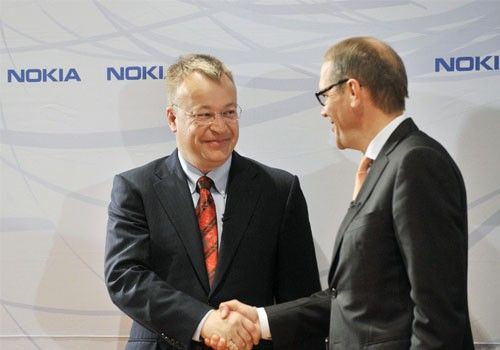Six Reasons Why Nokia Adopted WP7

It is official. Nokia (NYSE: NOK) will be adopting Microsoft's (NASDAQ: MSFT) Windows Phone 7 as its new smartphone operating system (OS), a move that could be the beginning of a new era for the Finnish mobile giant.
Adoption of a new OS is considered as a key step for Nokia to regain its market share in the United States, which is the biggest market for smartphones.
In an open letter published on Friday, the Chief executives of both companies announced the partnership stating that it combines the respective strengths of the two companies and builds a new global mobile ecosystem.
For Nokia, it is getting a decent OS for its smartphones. In return, a partner like Nokia could help bring Windows Phone to a larger range of price points, market segments and geographies.
Today, the battle is moving from one of mobile devices to one of mobile ecosystems, and our strengths here are complementary, the chief executives said.
There are other mobile ecosystems. We will disrupt them. There will be challenges. We will overcome them. Success requires speed. We will be swift, the executives added.
Following could be the six key reasons why Nokia might have opted for Windows Phone 7:
Improved UI: The first argument in favor of Windows Phone 7 (WP7) for Nokia is that it is a touch-screen user interface (UI) that presents a significant improvement over Symbian and drive a market share recovery over time.
Hardware Support: The lack of significant hardware support for WP7 is an attraction for Nokia paving the way for some sort of exclusivity and relative differentiation in the market place.
Leverage: By adopting WP7, Nokia could implement a decent touch screen OS for the smartphone market as WP7 offers tighter integration of Xbox and Zune services.
Differentiation: By moving towards Windows Phone 7, the company would now be able to differentiate the customer experience in an easier manner as compared to Android OS, especially given weak presence of Windows Phone 7 at vendors which are supporting both Microsoft and Android operating systems.
Microsoft - A flexible Partner: Compared to Google, Microsoft could be a flexible partner for Nokia as Google follows a practice of controlling specifications tightly, in the process frustrating some of the device vendors.
Although Microsoft has sold some 2 million for its new Windows Phone 7 OS so far, it is a far cry from the shipments of iOS and Android. The potential for almost instantaneous volume and credibility could allow for a flexible attitude from Microsoft. Nokia is still one of the biggest handset makers and has a strong presence in Asia and Europe.
Microsoft, Nokia Are Closer: Since, Stephen Elop himself coming from Microsoft, it is possible that he could have encourage a closer cooperation between the two companies. It would also pave way for faster integration of the new OS in to Nokia.
Analysts View
Credit Suisse analysts said a Microsoft-centric strategy could allow for a smartphone share recovery from mid-2012, improved revenue mix and margin recovery, but all depends upon Nokia's execution.
Indeed, assuming smartphone share recovers to 26 percent by 2013, this could drive earnings of €1.01 a share for Nokia.
On the flip side, WP7, which was launched in late 2010, include a rigid approach from Microsoft in terms of form factor and specifications. Secondly, Microsoft could charge a license fee (maybe $8 per device) for using its OS.
In addition, WP7 is currently not optimized for the low-end of the smartphone market, nor is it designed for the tablet market.
Meanwhile, disruption for Nokia seems to be very likely due the transition period required to adopt an operating system
We believe that adopting Windows Phone 7 could mean that Nokia potentially takes around 18 months to launch a new product in the market, Credit Suisse analysts wrote in a note to clients.
Given the fast changing nature of the business, the analysts believe this could result in its global smartphone share hitting a low point of 16 percent in the second quarter of 2012 before staging any subsequent recovery through the second half of 2012 and 2013.
Despite the above issues over the next 12-18 months, we believe that if the collaboration with Windows Phone 7 is successfully executed, Nokia could start to see its smartphone share starting to recover from mid-2012, analysts said.
© Copyright IBTimes 2024. All rights reserved.





















